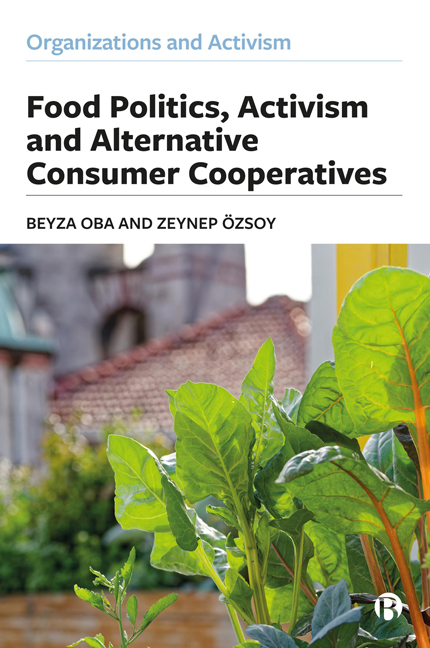Book contents
- Frontmatter
- Contents
- Series Editors’ Preface
- 1 Introduction: Experimenting with Direct Democracy
- 2 The Politics of Food: Alignment for Solidarity and Resistance
- 3 Against Neo-Liberalism and Authoritarianism: The Background to Food Politics in Turkey
- 4 The Political Economy of Consumer Cooperatives in Turkey
- 5 Alternative Consumer Cooperatives in the Making of a Public Sphere
- 6 Experimenting with an Alternative to the Capitalist Food Provisioning System
- 7 The Governance of Alternative Consumer Cooperatives
- 8 Instead of a Conclusion
- Notes
- References
- Index
1 - Introduction: Experimenting with Direct Democracy
Published online by Cambridge University Press: 27 March 2024
- Frontmatter
- Contents
- Series Editors’ Preface
- 1 Introduction: Experimenting with Direct Democracy
- 2 The Politics of Food: Alignment for Solidarity and Resistance
- 3 Against Neo-Liberalism and Authoritarianism: The Background to Food Politics in Turkey
- 4 The Political Economy of Consumer Cooperatives in Turkey
- 5 Alternative Consumer Cooperatives in the Making of a Public Sphere
- 6 Experimenting with an Alternative to the Capitalist Food Provisioning System
- 7 The Governance of Alternative Consumer Cooperatives
- 8 Instead of a Conclusion
- Notes
- References
- Index
Summary
In recent years the Turkish political domain has witnessed a multitude of solidarity initiatives such as consumer cooperatives, women-owned producer cooperatives and neighbourhood assemblies formed by citizens in an effort to express their discontent with the hegemonic neo-liberal project and the tone of its implementation. These initiatives, in response to full-blown neo-liberalism and the increasing drift towards authoritarianism, can be taken as enclaves of ‘hope’ where, through direct democracy and solidarity among various constituencies, excluded groups can be repositioned within the political and economic realm and citizens can have a voice in politics. Activists involved in these initiatives demand a ‘just’ distribution of resources within society and claim that by realizing their capabilities, by pursuing their ideals and by offering their time and labour they can shape power relations at the local level. Participants from diverse social and economic backgrounds – workers, professionals, university students, the unemployed – question the predominant norms of the existing political system and develop alternatives that can lead to change. In this book we focus on one of these initiatives: the alternative consumer cooperatives (ACCs) as spaces for prefigurative food politics.
In Turkey, the ACCs are different to conventional consumer cooperatives (CCCs), which have been instrumentalized either by the state or by companies for private gain. The ACCs proliferated after the 2013 Gezi Park protests as a reaction to the hegemony of capitalist relationships in the production and distribution of foodstuff. They are governed by activists who disregard managerialist logic and experiment with alternative ways of governance such as a zero hierarchy and consensus-based decision-making. The daily activities of the ACCs are carried out by consumers who offer their labour voluntarily and who provide examples of non-marketable forms of economic transactions such as reciprocity and social obligation. Given all these features, in this book we view ACCs as spaces of prefigurative politics where politically positioned consumers not only experiment with and gain insight into alternatives to the capitalist logic, but also reshape the existing power relations in and around the ACCs. In so doing, we expose the strategies employed by the government in the construction of a globally oriented capitalist production/consumption nexus in agriculture and explore how ACCs develop counter-strategies to resist and challenge the status quo.
- Type
- Chapter
- Information
- Publisher: Bristol University PressPrint publication year: 2023

